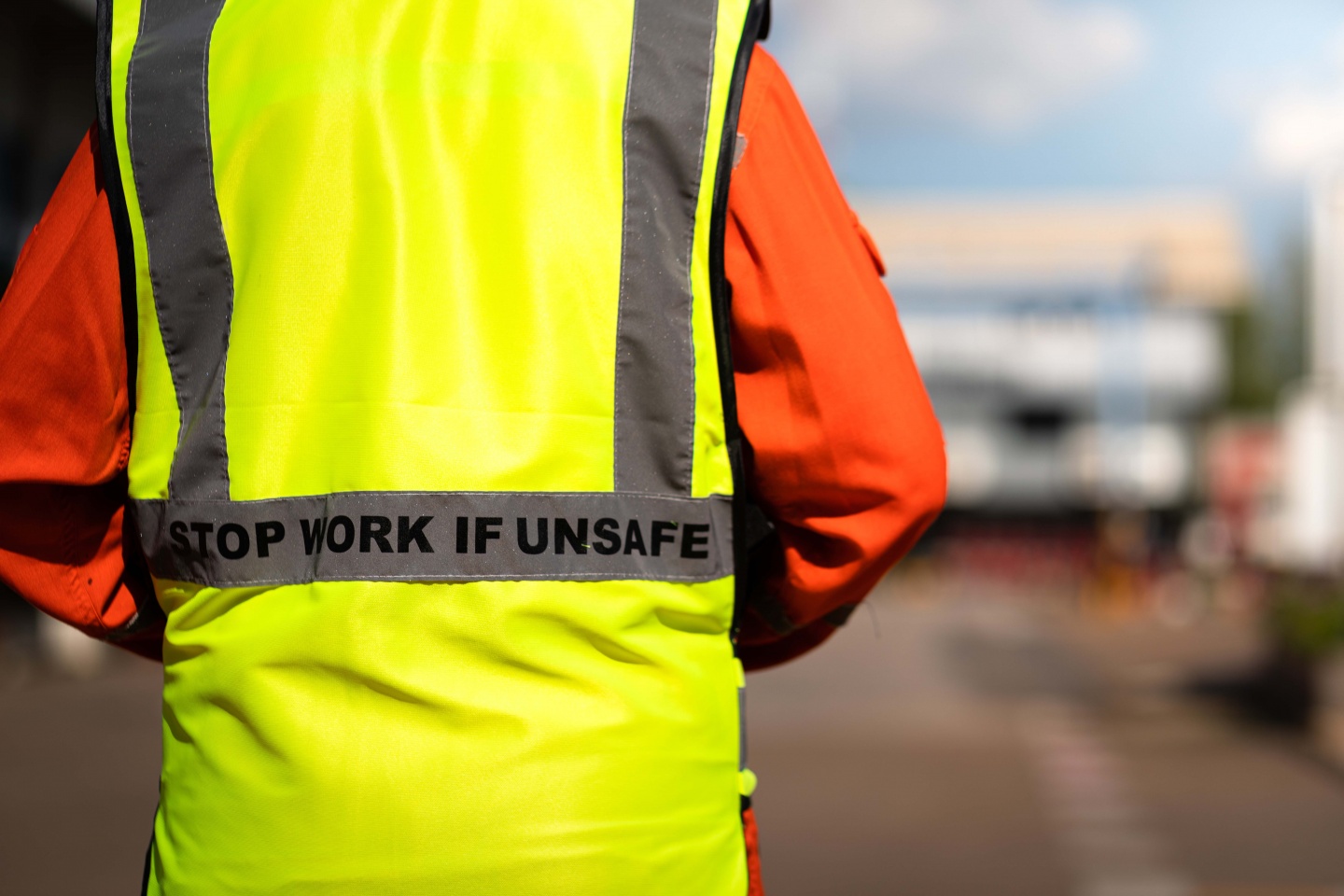8 April, 2020IndustriALL Global Union's publication on the right to refuse or to shut down unsafe work.
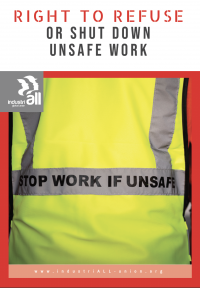 | 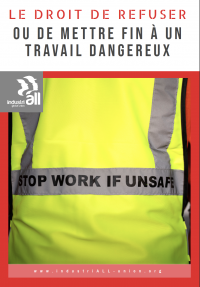 | 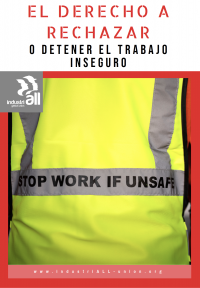 |
| ENG | FRA | ESP |
What is meant by a “right”
A right is something that you are morally or legally entitled to do, or to have.
Workers do not automatically enjoy the legal right to refuse or shut down unsafe work in every jurisdiction or in every circumstance. However we always have the moral right to refuse or shut down unsafe work. In serious circumstances, we believe that not only do we have the right to refuse or shut down unsafe work, we have a duty to do so.
Our problems arise when the exercise of that right is not protected from reprisals by the employer.
Notice that wherever workers enjoy the legal right to refuse unsafe work, either in national or regional laws, or in collective bargaining agreements, it has always followed worker activism and demands; never preceded it. Our rights are rarely given to us freely – we must demand and fight for them.
International Law
The United Nations’ Universal Declaration of Human Rights, Article 3, states “Everyone has the right to life, liberty and security of person.” It does not state that these rights disappear when you go to work. Indeed, the right to favourable conditions of work is also mentioned in the Universal Declaration of Human Rights. Another United Nations document, the International Covenant on Economic, Social and
Cultural Rights, provides that everyone should have the right to safe and healthy working conditions.
However, the most important references to the right to refuse unsafe work come from the International Labour Organization (ILO), a specialized United Nations agency dealing with international labour standards. The ILO has several Conventions and Recommendations that mention the right to refuse unsafe work. The most generally significant of these is Convention 155, the Occupational Safety and Health Convention, 1981.
Convention 155 states (excerpts):
- “Article 4 (1) Each Member shall, in the light of national conditions and practice, and in consultation with the most representative organisations of employers and workers, formulate, implement and periodically review a coherent national policy on occupational safety, occupational health and the working environment. (2) The aim of the policy shall be to prevent accidents and injury to health arising out of, linked with or occurring in the course of work, by minimising, so far as is reasonably practicable, the causes of hazards inherent in the working environment.
- “Article 5 (e) the protection of workers and their representatives from disciplinary measures as a result of actions properly taken by them in conformity with the policy referred to in Article 4 of this Convention.
- “Article 13. A worker who has removed himself from a work situation which he has reasonable justification to believe presents an imminent and serious danger to his life or health shall be protected from undue consequences in accordance with national conditions and practice.
- “Article 19. There shall be arrangements at the level of the undertaking . . . (f ). a worker reports forthwith to his immediate supervisor any situation which he has reasonable justification to believe presents an imminent and serious danger to his life or health; until the employer has taken remedial action, if necessary, the employer cannot require workers to return to a work situation where there is continuing imminent and serious danger to life or health.”
In plain language, this says that within the context of national law, workers can, with reasonable justification, remove themselves from unsafe work and not return until the employer has remedied the situation, and if they have exercised this right in good faith they cannot suffer undue consequences.
Other ILO Conventions also make reference to this right. For example, Convention 176, the Safety and Health in Mines Convention, 1995; Recommendation 183 on Safety and Health in Mines, 1995; Recommendation 172 on Asbestos, 1986; and Recommendation 177 on Chemicals, 1990.
ILO Conventions have legal standing when ratified, but your national government may not have ratified these Conventions. Recommendations, as the title suggests, are not necessarily legally enforceable. However, both ILO Conventions and ILO Recommendations can be referred to as part of international best practice – sometimes, even in countries that have not ratified the relevant Convention.
National or Regional (State; Provincial, or other) Occupational Health and Safety Law
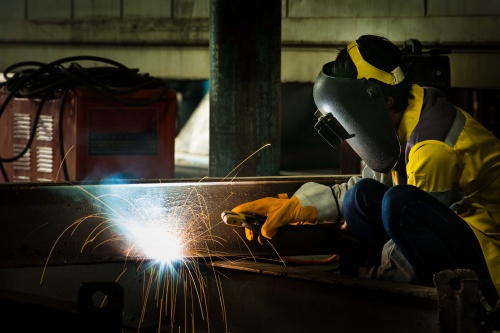
National or regional law varies widely across the globe, and you must verify what the law says in your jurisdiction.
If the legislative and regulatory framework for occupational health and safety in your jurisdiction protects the right to refuse or shut down unsafe work, there will normally be a strict procedure to be followed in exercising this right. The procedure will outline what kinds of hazardous or risky work will be considered legally refusable, and the steps you must take to refuse to do it. Normally this will include reporting the danger to your supervisor, removing yourself from immediate harm while waiting for the matter to be investigated, and a dispute resolution procedure. Make sure you familiarize yourself with the procedure that applies to you, and follow it closely, to protect yourself from discipline or discharge.
Even if the occupational health and safety law does not specifically guarantee the right to refuse unsafe work, the general laws of most nations protect your right to defend your own life. This right does not disappear when you enter a workplace. Check with someone knowledgeable about the laws in your jurisdiction.
Collective Bargaining Agreements
Check your collective bargaining agreement (CBA). Many collective bargaining agreements make reference to the right to refuse or shut down unsafe work. Often, a strict procedure for exercising this right will also be specified. Make sure you familiarize yourself with the procedure and follow it closely, to protect yourself from discipline or discharge.
Conclusion
When there is a disagreement in the interpretation of labour law or collective agreements between an employer and a worker, the general rule is to comply now, and grieve later. This advice serves to protect the worker from immediate discipline or discharge, on the belief that if a labour arbitrator or judge later rule in favour of the worker, an appropriate remedy can be applied. Lost wages can be repaid, workers can be restored to their rightful positions, indignities can be compensated.
However, in the case of occupational health and safety this general rule cannot apply. There is no remedy that an arbitrator can impose that will restore life or health, if it is lost.
The right to refuse, or to shut down, unsafe or unhealthy work is not automatically guaranteed by law or by CBA. Like all human rights, we assert our moral authority when we demand it. It is a right that we must win, or lose it along with our health or our life.
That’s what trade unions mean when we say “you have the right to refuse unsafe work”.
Don’t take your rights to the grave.
